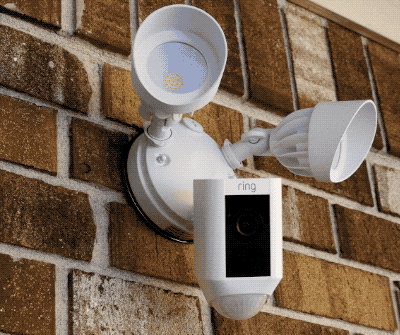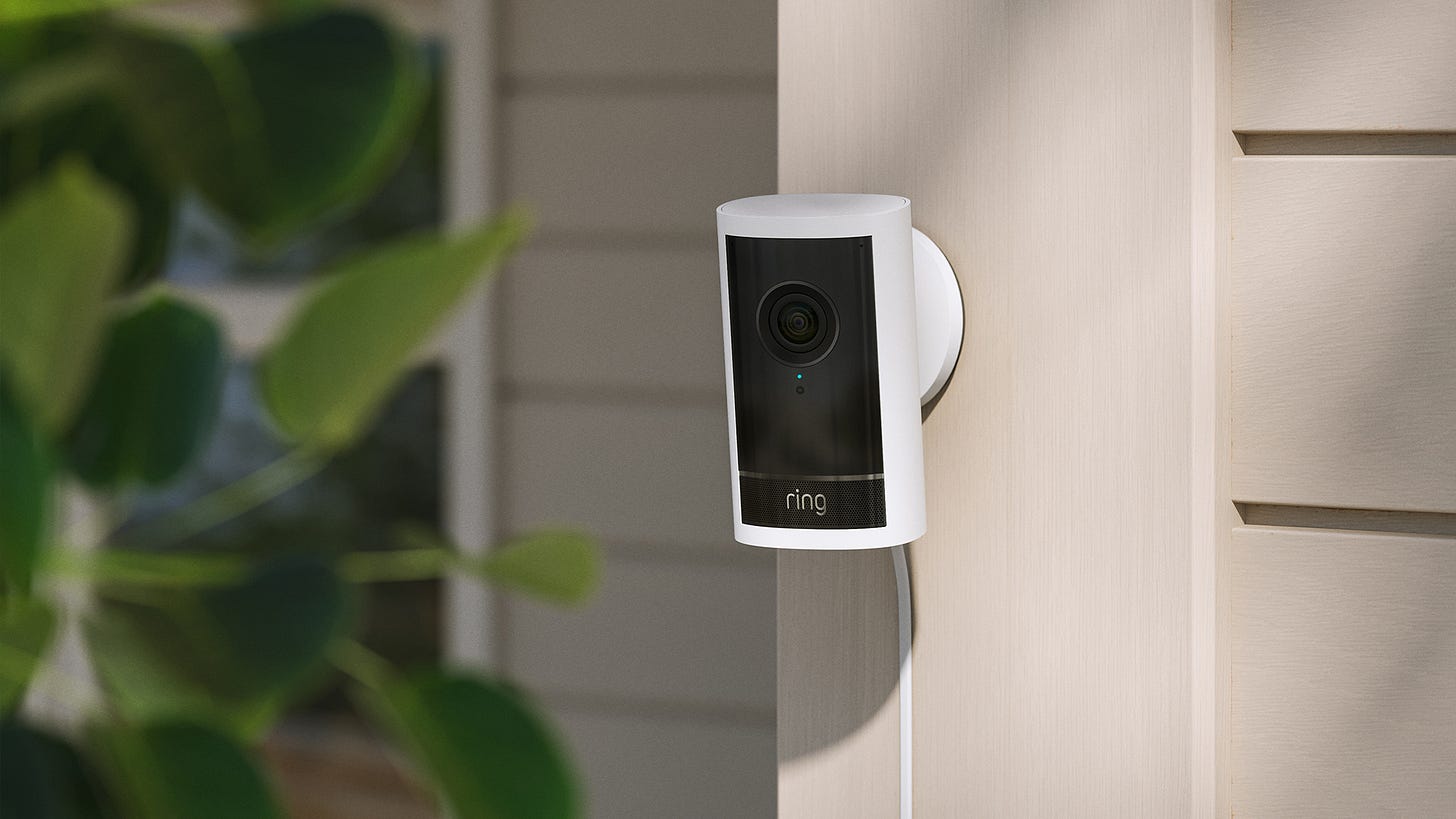
AI: Next big AI services could be in & around the Home. RTZ #865
Bigger Picture, Sunday, October 5, 2025
As you may have noticed in several posts on AI: RTZ this week, the Mag 7 companies are in a race to develop AI Smart Glasses and Devices. To evolve platforms beyond Smartphones an AI Chatbots, towards future AI applications and services. The next two years will see tens of millions of these devices sold by Meta, Amazon, Google and Apple, along with OpenAI and its Jony Ive powered AI devices next year.
But while all eyes are focused on AI smart glasses, the actual way to ambient AI devices this AI Tech Wave, may be sneaking in via the back door. With new AI applications not possible until now.
I’m talkiing about the hundreds of millions of pre-LLM AI voice devices in and around our homes. Especially the ones with cameras at our front and back doors.
These are all being rapidly upgraded with ChatGPT like voice and video enabled AIs. Yes, I’m talking about AI upgraded Amazon Alexas and Ring home security devices, Apple Siris, and Google Nests/Google Home devices soon powered by its Gemini AIs.
This is the Bigger Picture I’d like to discuss this Sunday.
As I summarized this week, both Amazon and Google had a range of product announcements round their ubiquitous Amazon Ring and Google Home security cameras being packed with LLM AIs. The first takes by revieweres of the new capabilities here are notable in terms of AI finding new uses beyond not just securing our homes on the outside, but potentially providing super useful services from the inside.
The WSJ highlights some of this in “The Radical Changes that are making your Smart Home less Dumb”:
“Amazon’s Alexa+ and Google’s Gemini for Home provide natural conversations while Ring cameras will soon find lost dogs.”
“A decade ago, Amazon’s Echo and Google’s Home offered us a taste of the future: We speak, and our homes respond. But when ChatGPT and other AI chatbots arrived, those “smart” speakers started to feel pretty basic.”
“Now that they’re getting a generative-AI overhaul, the question is: Can we get more out of devices that until now have been great at setting kitchen timers, reading the weather and playing music?”
Cue the ‘smart homes’ theme we’ve been listening to for over a decade:
“Most homes are “smart”: Consumer-tech tracking firm Parks Associates reports just over half of internet-connected U.S. households own at least one smart speaker. Yet smart-home adoption has stalled since peaking in 2021, says research firm IDC. Anyone who has wrestled with a smart light, thermostat or other home tech knows the pain. A multitude of fussy apps and the need to memorize countless verbal commands were a big part of the problem.”
“Amazon’s Alexa+ and Google’s Gemini aim to fix that, by making smart homes less dumb. The tech giants introduced new speakers, home displays and cameras this week to capitalize on their evolved assistants, but most existing devices are also compatible.”
“Gemini for Home arrives at the end of the month, and Amazon says 10 million households already have early access to Alexa+. As we wait for Apple’s Siri to catch up—and we’re hoping for news sometime next year—here are the three big changes coming to our homes right now.”
What’s more noteworthy are the camera equipped devices from Google, Amazon, Apple, and others, that are being upgraded with Generative LLM AI capabilities that weren’t possible until now:
“Cameras that tell you what’s happening”
“When you get a security camera alert, you tend to open an app and peer in wondering at what might be lurking in or outside your house.”
“With Gemini for Home—which you can gain early access now in the Google Home app—Nest cam notifications have more useful descriptions, such as “Dog jumped out of playpen,” or “USPS dropped a package off on your porch.”
“Inside the app, you can ask queries like, “When did the gardener arrive last week?” to pull up relevant clips. In a demo, “What ate my grass?” showed rabbits munching in the garden. The cameras can also summarize daily highlights such as kid activity or package delivery.”
“Amazon’s Ring announced similar features called Video Descriptions and Smart Video Search earlier this year—available to Home Premium plans.”
More features are being planned to be introduced soon:
“In December, Ring will add Familiar Faces, allowing its doorbells and other cameras to recognize people you know. The system matches faces based on your videos only, and the identification is stored with your account.”
“Also coming in December is a service that allows Alexa+ to greet people at the door, whether they’re familiar or unfamiliar faces.”
“Ring is attempting a more ambitious task as well: finding lost dogs. You can trigger a “Search Party” by providing details and a photo of your missing dog. Any outdoor Ring cameras in the vicinity that spot your dog will alert those camera owners. If they want to notify you, they can with a tap. (They can also choose to ignore the alert, and even disable Search Party entirely.)”
“Search Party, available in November, is only for dogs at launch, but Amazon is looking beyond canines. In addition to evaluating algorithms for other pets—hello, cats!—it is considering monitoring for lost people as well.”
“There are thousands of people missing with dementia all the time, so you can imagine looking for them,” says Jamie Siminoff, who founded Ring and currently heads the Amazon subsidiary. Siminoff noted the privacy concerns, and emphasized that videos will never be shared without the consent of the camera users.”
This last one resonates personally. Until my Dad passed away in his early nineities this year, his accelerating Alzheimer’s meant constant concerns about his behavior in and around my sister’s house where he lived. Her Google and Amazon cameras in and outside the house were not powerful enough then to update us when he moved around in concerning ways. Today, these systems augmented by AI, can monitor those movements closely and provide granular ‘peace of mind’ reports.
An important issue mentioned above, is of course trust and privacy. It’s an issue I’ve discussed as a key priority this time around with AI applications and services.
“In addition, Ring says it doesn’t use private customer videos to train its AI models.”
Another issue is anthropomorphizing and humanizing these AIs, also an issue I’ve argued against:
“Speakers that have real conversations”
“As soon as you upgrade to Alexa+ or Gemini for Home, the biggest change you’ll notice is the humanness of the assistant. Conversations flow freely; you don’t need to repeat the wake word.”
The road to these AI services is paved with good intentions:
“Amazon’s devices chief, Panos Panay, shared how his wife’s frustration with their son—“He just leaves the lights on!”—led her to ask Alexa to turn off lights each night at a given time. She didn’t realize she had created a routine, he says.”
“Amazon’s new devices are equipped with more sensors to understand what’s happening in your home. In other features rolling out in the coming months, they’ll learn habits—who’s home during the day, what doors should be locked after 10 p.m.—and will be able to adjust routines and alerts based on those patterns, the company says. (Alexa+ will come with all the new Echo devices.)”
“We’ll be doing more testing with Alexa+, Gemini for Home and the new devices. But these smart assistants already feel less like high-maintenance houseguests and more like part of the family: They listen, learn and might even help find the missing dog.”
But it’s a slippery slope towards over-humanizing AIs before they’re ready to be trusted with everything involving private matters in the home and beyond.
That is the Bigger Picture that needs to be kept in mind. Especially as we race towards AI devices beyond the chatbot in this AI Tech Wave. Stay tuned.
(NOTE: The discussions here are for information purposes only, and not meant as investment advice at any time. Thanks for joining us here)











